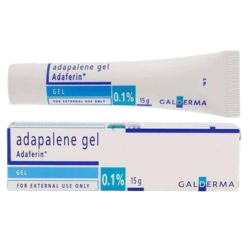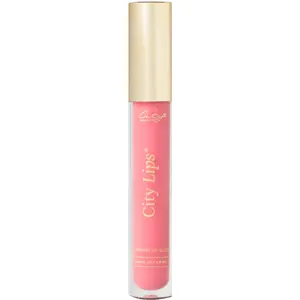We looked into Adapalene Gel on the basis of its ingredients, customer reviews, and more. Does Adapalene Gel really work? Read the Adapalene Gel review here!
Overview
Adapalene Gel is a topical medication that is used for the treatment of acne. It belongs to a class of drugs called retinoids, which work by unclogging pores and reducing inflammation. Adapalene Gel is available by prescription and is known for its effectiveness in clearing acne and improving the overall appearance of the skin.
What is Adapalene Gel?
Adapalene Gel is a dermatologist-recommended treatment for acne. It is formulated with the active ingredient adapalene, which is a retinoid compound. This gel is specifically designed to target the causes of acne and is suitable for all skin types. Adapalene Gel is known for its ability to prevent the formation of new acne lesions and promote skin cell turnover.

Adapalene Gel
How does Adapalene Gel work?
Adapalene Gel works by normalizing the turnover of skin cells and preventing the formation of acne. It helps in unclogging pores, reducing inflammation, and promoting the growth of healthy skin cells. Adapalene, the active ingredient in the gel, stimulates the renewal of skin cells, which helps to prevent the formation of acne lesions. It also has anti-inflammatory properties that reduce redness and swelling associated with acne.
Advertisement
*All individuals are unique. Your results can and will vary.
Ingredients
- Adapalene
Adapalene is the active ingredient in Adapalene Gel. It is a synthetic retinoid that helps regulate cell turnover, unclog pores, and prevent the formation of acne lesions. Adapalene is known for its anti-inflammatory properties, which help reduce redness and swelling associated with acne.[1] - Water
Water is the base ingredient in Adapalene Gel and serves as a solvent for other components. It helps to deliver the active ingredients to the skin and provides a suitable medium for the gel formulation.[2] - Carbomer
Carbomer is a thickening agent used in the gel to give it a desirable consistency and texture. It helps to ensure that the gel spreads smoothly and evenly onto the skin during application.[3] - Glycerin
Glycerin is a humectant that attracts moisture to the skin. It helps to keep the skin hydrated and maintain its moisture balance. Glycerin also contributes to the overall texture of the gel and helps in preventing excessive dryness.[4] - Sodium Hydroxide
Sodium hydroxide is a pH adjuster that helps maintain the optimal pH level of the gel. It ensures that the gel is within the appropriate pH range for effective application on the skin.[5]
Pros and Cons of Adapalene Gel
Pros
- Effectively treats acne and prevents new acne lesions.
- Reduces inflammation and redness associated with acne.
- Improves overall skin texture and appearance.
- Suitable for all skin types.
Cons
- May cause initial dryness or peeling of the skin.
- Some individuals may experience mild skin irritation.
- Not suitable for use during pregnancy or while breastfeeding without consulting a healthcare professional.
- May increase skin sensitivity to sunlight, so proper sun protection is necessary.
Customer Review
I’ve tried numerous acne treatments, but Adapalene Gel has been the most effective for me. It not only cleared my existing acne but also prevented new breakouts.
~ Allen
I’ve been using Adapalene Gel for several months now, and I couldn’t be happier with the results. My acne has significantly reduced, and my skin has a smoother texture. It has truly transformed my complexion.
~ Roma
FAQ’s
Q: How long does it take for Adapalene Gel to work?
A: The results of using Adapalene Gel may vary from person to person. It typically takes several weeks of consistent use to see noticeable improvements in acne. It is important to follow the prescribed treatment regimen and be patient with the results.
Q: Can Adapalene Gel be used on sensitive skin?
A: Adapalene Gel is generally well-tolerated, but some individuals with sensitive skin may experience mild irritation. It is recommended to perform a patch test before applying it to the entire face. If you experience excessive dryness or irritation, it is best to consult a dermatologist.
Q: Can Adapalene Gel be used during pregnancy?
A: It is advisable to consult with a healthcare professional before using Adapalene Gel during pregnancy or while breastfeeding. They can assess the potential risks and benefits and provide suitable recommendations based on your specific situation.
Q: How should Adapalene Gel be applied?
A: Adapalene Gel should be applied to clean and dry skin once daily, usually in the evening. Start with a small amount and gently spread a thin layer over the affected areas. Avoid contact with eyes, lips, and mucous membranes. Follow the instructions provided by your healthcare provider.
Conclusion
Adapalene Gel is a trusted and effective solution for treating acne. Its active ingredient, adapalene, helps in unclogging pores, reducing inflammation, and promoting the growth of healthy skin cells. With consistent use, Adapalene Gel can significantly improve the appearance of acne and enhance the overall texture of the skin. If you are dealing with acne-related concerns, consult a dermatologist to see if Adapalene Gel is the right choice for you.
Advertisement
*All individuals are unique. Your results can and will vary.
5 Sources
[2] Water - https://www.ncbi.nlm.nih.gov/pmc/articles/PMC2908954/
[3] Carbomer - https://www.ncbi.nlm.nih.gov/pmc/articles/PMC6544708/
[4] Glycerin - https://pubmed.ncbi.nlm.nih.gov/31840548/
[5] Sodium Hydroxide - https://www.ncbi.nlm.nih.gov/books/NBK208293/










